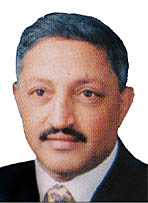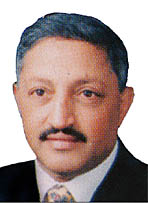
Time to prioritize our national economy [Archives:2002/24/Business & Economy]
June 10 2002

Mohammed al-Massani of Yemen Times met Regional Manager of Hayel Saeed Group of Companies in Sanaa, Mr. Mohammed Abdu Saeed, and discussed with him the current status of the manufacturing sector in Yemen. Excerpts.
YT: How do you assess the current situation of the manufacturing sector and the problems youre facing right now?
Mr. Saeed: The manufacturing sector has been greatly influenced by the abrupt openness to markets. When the government adopted the market-oriented policy, the manufacturing sector, despite its small size, has not been well-receptive to such change. It was much better to adopt this change gradually in order to enable it to be more competitive. The uncontrolled flow of products to the Yemeni markets has negatively affected the emerging manufacturing sector forcing many enterprises to shut down. The other enterprises that could absorb the first blow have survived, because they have good financial position that has enabled them to remain competitive in the markets. Another important factor that helped these companies to survive is that they produce high quality products.
YT: Whats your assessment of the open-market policy, and what about the role of foreign investors in supporting the national economy?
Mr. Saeed: Governments economic openness is necessary to accommodate the international variables, such as the collapse of the USSR, globalization, and the accession to the World Trade organization (WTO). We are not against the openness policy, but we believe that it should be studied well and implement gradually to reach the same outcomes.
As for foreign investments in Yemen, they are very limited except for the oil exploration and production sector due to the special nature of this industry.
The reasons for the low foreign investments in Yemen are ascribable to a host of issues like insecurity, poor infrastructure, and the lack of well-qualified manpower. These are some reasons discouraging any foreign investor to come to Yemen. After all, good investment legislations are not all what matter. There are many countries in the world that really provide these facilities to investments.
YT: How we can create investment related awareness and promote long-term investments as well?
Mr. Saeed: This can be created through creating a climate conductive to investment plus building the necessary infrastructure (ports, telecommunication, electricity and roads) required for boosting the national economy as a whole. Also, the financing aspects pertaining to investments are not in anyway encouraging owing to the low interests rates.
YT: What are the impact of Yemens accession to the WTO. And will the accession process in anyway help integrating Yemen within the international trade?
Mr. Saeed: Yemens accession to the World Trade Organization is the least of the two evils since Yemen can not be isolated from the outside world. Its hoped that the accession process will be proceeded carefully and through transitional arrangements after meeting the majority of the accession requirements. The whole process should be undertaken through special arrangements and benefiting from the preferences granted to the least developed countries (LDCs). We should also have a good team of negotiators to broker the accession in ways that serve the national economy.
YT: On your opinion, does the Investment Promotion Law gives facilitation to local investors?
Mr. Saeed: The law is OK by itself. Also, some essential amendments which will grant more facilitation to investments. The amendments are to be endorsed soon. Still, all these things are not enough for promoting investments as laws can be excellent, but what is more important is the general climate conducive for investments.
YT: How much have you been affected by the September 11 incidents?
Mr. Saeed: The whole world has been affected by that incidents. As part of this world we have been influenced by such major events, especially in terms of insurance and transportation costs which have tremendously skyrocketed. This addition costs have in turn been reflected on the prices of our products. But, generally speaking, there is no direct affect on our business as the major impact will be on the national economy as a whole. According to some officials statements Yemen has lost a lot as a result of these incidents.
YT: What about your future projects?
Mr. Saeed: In the last couple of years we started investing in the tourism sector represented by the establishment of the Sufitel Hotel in Taiz May 23. As for the heath sector we intend to build a big hospital.
In Aden we are currently implementing a huge trade center. We have ambitions to build a cement plant which is presently under review. Similarly, we are planning to establish a textile factory with the view of exporting its products overseas, but this wont be set out till the Yemeni government finalized its bilateral trade agreements with the European Union and the US government. After completing these agreements we will inshalah start manufacturing fabrics and garments for exporting. Its hoped that this factory will employ a big number of workers.
YT: Can you brief us on your contributions to charitable works?
Mr. Saeed: As far as our humanitarian activities are concerned, it dates back to the early 1970 as we have one of the oldest charitable associations in Yemen. Just last week we celebrated the graduation of 221 university students funded by our association. Some of these students studied in Yemen and some other studied outside. We have also a long track in supporting healthcare projects and sending patients for medication abroad.
Our association further helps poor families through granting them monthly salaries. We support small enterprises belonging to women to help them acquire new skills for making money. We also contribute to the establishments of mosques across the country.
YT: Any final comment you might like to add?
Mr. Saeed: I hope that the government would give the national economy top priority right now, especially as we have solved our border disputes with our neighbors under the wise leadership of president Ali Abdulah Saleh. I believe that we have already sorted out our external problems, and its the right time now for boosting our national economy through removing the impediments that obstruct its progress.
——
[archive-e:24-v:2002-y:2002-d:2002-06-10-p:./2002/iss24/b&e.htm]


